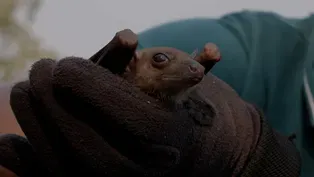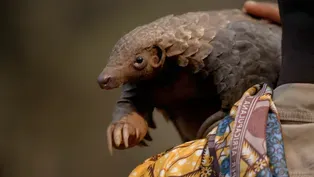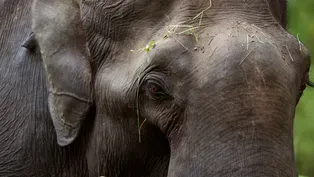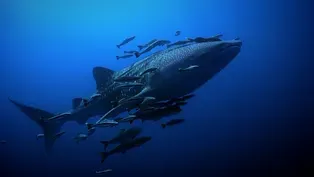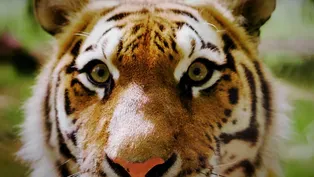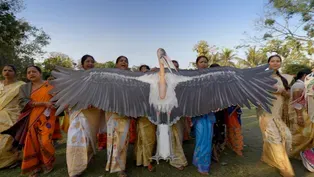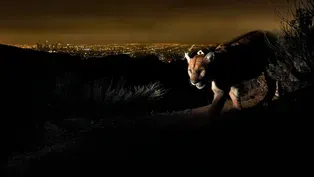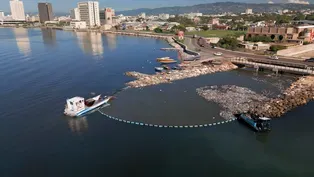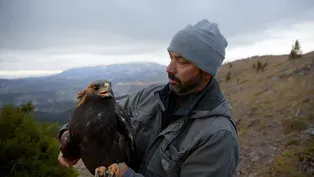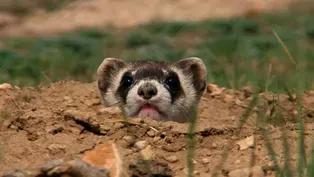
Reclaiming Bear River | WILD HOPE
Special | 17m 25sVideo has Closed Captions
The Bear River was once a lush area with wetlands, hot springs, and abundant wildlife.
Over 150 years after suffering the worst massacre in U.S. history, the Northwestern Band of the Shoshone Nation has purchased their ancestral homeland — called Wuda Ogwa, or Bear River — with a vision to return it back to nature.
Problems with Closed Captions? Closed Captioning Feedback
Problems with Closed Captions? Closed Captioning Feedback
Major support for NATURE is provided by The Arnhold Family in memory of Henry and Clarisse Arnhold, The Fairweather Foundation, Sue and Edgar Wachenheim III, Charles Rosenblum, Kathy Chiao and...

Reclaiming Bear River | WILD HOPE
Special | 17m 25sVideo has Closed Captions
Over 150 years after suffering the worst massacre in U.S. history, the Northwestern Band of the Shoshone Nation has purchased their ancestral homeland — called Wuda Ogwa, or Bear River — with a vision to return it back to nature.
Problems with Closed Captions? Closed Captioning Feedback
How to Watch Nature
Nature is available to stream on pbs.org and the free PBS App, available on iPhone, Apple TV, Android TV, Android smartphones, Amazon Fire TV, Amazon Fire Tablet, Roku, Samsung Smart TV, and Vizio.
Buy Now

Explore More Ways to Watch
Bring the beauty and wonders of wildlife and natural history into your home with classic NATURE episodes.Providing Support for PBS.org
Learn Moreabout PBS online sponsorshipMore from This Collection
Building for Birds | WILD HOPE
Video has Closed Captions
Millions of migrating birds pass through our yards, but glass windows pose a deadly threat. (16m 3s)
Mission Impossible | WILD HOPE
Video has Closed Captions
Meet the genius behind the plant-based Impossible Burger. (39m 41s)
Pangolin Protectors | WILD HOPE
Video has Closed Captions
Due to the demand for their scales, pangolins are the most trafficked animal in the world. (12m 24s)
Way of the Elephants | WILD HOPE
Video has Closed Captions
Elephant migration corridors in India are a necessary thoroughfare for one of the largest animals. (15m 11s)
Whale Shark Homecoming | WILD HOPE
Video has Closed Captions
A renowned spiritual leader is inspiring fishermen to become guardians of the world’s biggest fish. (16m 49s)
Video has Closed Captions
The artificial intelligence keeping tigers at bay. (14m 31s)
Video has Closed Captions
In northeastern India, the greater adjutant stork has been considered an ill omen for generations. (16m 40s)
Video has Closed Captions
One cougar’s legacy in the heart of Hollywood. (13m 56s)
The Great Ocean Cleanup | WILD HOPE
Video has Closed Captions
Inventor Boyan Slat is on a mission to rid oceans of plastic. (15m 12s)
Video has Closed Captions
Golden eagles are declining due to an unlikely poison: lead ammunition left behind by game hunters. (13m 11s)
Video has Closed Captions
The decades-long fight to save America’s black-footed ferrets. (18m 11s)
Providing Support for PBS.org
Learn Moreabout PBS online sponsorship♪ (plants rustling) BRAD: This used to be a place of joy that provided for my ancestors.
We didn't take more than we needed.
There was always fish and deer and waterfowl.
The Bear River Massacre was the largest massacre of Native Americans in United States history.
This is a graveyard.
This is our Arlington Cemetery.
This is where our people had to fight for their freedom and to exist.
♪ I want to take this land back in time to when it was wild, and restore our connection to it.
♪ (excavator operating) ♪ (Rios speaking Shoshoni) NARRATOR: The Northwestern band of the Shoshone Nation looked after the Bear River ecosystem for thousands of years.
(Rios speaking Shoshoni) ♪ (birds chirping) The nomadic tribe came here to the place they call "Wuda Ogwa," every winter.
♪ (water burbling) The clean water teemed with trout and game birds.
♪ (duck splashing) (duck squeaks) (water splashes) Hot springs heated the ground, allowing year-round pasture for horses.
(horse whinnies) (water splashing) BRAD: While there's snow and cold everywhere else, the warmth of the earth is heating your teepee.
We were dependent on Mother Earth.
♪ (leaves rustling) NARRATOR: It was also the site for an important annual gathering: the warm dance.
♪ PATTY: We would have other Shoshone people come in and they would meet and they would dance and have ceremony, find mates, exchange stories, see relatives.
♪ NARRATOR: Then, in 1863, everything changed.
(gunfire) ♪ BRAD: In one day, thousands of years of warm dance celebration crumbled.
♪ 500 native men, women, and children were killed by the United States Army.
(gunshot cracks) A lot of people know Wounded Knee, and a lot of people know Sand Creek, but we were bigger than both of them.
NARRATOR: The massacres were spurred by the settlers' belief in Manifest Destiny, that they had a God-given right to control all of North America.
Like so many others, the Northwestern Band of the Shoshone were either killed or displaced.
♪ Since that day, the tribe has been landless, with no place to practice their traditions or call "home."
(leaves rustling) BRAD: We were promised a reservation but never given one.
And it's taken us 160 years just to get back to the numbers that we had when we camped here.
PATTY: My mom, she would tell us, she says, run and hide.
They're gonna kill you.
So I grew up with that.
I've always felt like I was a visitor.
I never felt like I belonged here.
(insects chittering) ♪ ♪ NARRATOR: Then, in 2018, the tribe purchase these 400 acres in southern Idaho with a vision to restore their ancestral land and reclaim their role as stewards of the Bear River.
♪ (cranes cawing) But the land they purchased looked nothing like their ancestors' camping grounds.
(traffic whooshes) ♪ Following the massacre, farmers had reshaped it for large-scale agriculture.
♪ BRAD: They cut down all the trees, brought in extra silt and extra dirt to flatten everything out.
They completely rerouted the water and how they used it.
♪ NARRATOR: Battle Creek is a tributary of the Bear River, now trapped in a canal, ♪ (water trickling) but it used to meander free, creating ponds and wetlands.
(insects chittering) Native vegetation supported animals and people alike.
(bird cawing) (water sloshing) BRAD: This place would've been covered in trees and willows and chokecherries.
It's just a flat field, nowadays.
♪ Where you're standing right now is basically ground zero, the massacre site.
We're restoring our home.
That's why we're doing this project, and we appreciate all the help, the Tribe can't do it on its own.
♪ NARRATOR: Brad has brought in a skilled team to restore this land.
They must redirect water, replace invasive trees with native ones, and recover lost wetlands.
(Rios speaking Shoshoni) ♪ BRAD: We'll be reestablishing the things that are supposed to be here, which will help the land.
You need biologists, and you need geologists and you need engineers.
You need native people, you need that native knowledge.
You need contractors and construction workers that understand this place.
♪ RIOS: Thank you.
BRAD: The first thing we need to do is return the water's natural flow.
That makes everything else possible.
♪ NARRATOR: Four years of planning led to this moment.
BRAD: So we can irrigate these fields.
(excavator operating) (excavator operating) ♪ NARRATOR: Contractors will breach the canal that restrains Battle Creek.
♪ (machinery rumbling) They install a pipe to divert the water out over the fields.
WORKER: All right.
♪ BRAD: We have to use modern machinery and modern technology to force the water back.
(debris falling) ♪ ♪ It will be a wonderful sight to see that water free flowing over the ground instead of in this ditch.
We just had trickles before.
(water rushing) ♪ (water rushing) (Brad speaks indistinctly) (water rushing) ♪ ♪ (volunteers chuckle) (water rushing) ♪ BRAD: This is awesome!
BRIAN: Isn't that exciting?
BRAD: Dude, seriously.
That is way cool.
♪ (water rushing) That is a great job.
♪ (water rushing) NARRATOR: With the water freed, Battle Creek will slowly be reborn, carving its new route to the Bear River.
(water rushing) ♪ But that's only step one.
♪ BRAD: Battle Creek has some of the dirtiest water in the entire Bear River watershed.
The water quality is just gone because of all the sediment and pollutants that get in there due to farming practices.
NARRATOR: So farther upstream, Brad deploys a second team to clean up the mess, borrowing a tried-and-true technique from nature.
ROSE: Today, we're gonna be building what's called a beaver dam analog.
They are human- made structures that mimic beaver dams.
(water rushing) ♪ NARRATOR: Beavers are natural-born builders.
They construct dams and lodges that slow the flow of water, filtering out impurities.
♪ BRAD: When you take the beaver out of that equation, you have chocolate milk water like we have now.
♪ NARRATOR: They also create pools, which provide refuge for fish during the driest months.
BRAD: We camped here because there were trout here.
That was a really basic food source that was always on hand.
If you have beaver, you have fish.
If you have fish, you have birds.
That water gets displaced, so then we have willows and cattails and milkweed.
♪ (machinery rumbling) ♪ (machinery rumbling) ♪ ♪ NARRATOR: Nearby vegetation and clumps of mud create a natural barrier that prevents sediment from traveling downstream.
ROSIE: I'll hand you a shovel.
We can start taking muck, and mud and kind of pile it in there.
(workers speak indistinctly) BRAD: It will start to back the flow of water up.
And so that sediment gets dispersed, and then that dam acts as that water quality filter, the same way an actual beaver dam would.
And we want to start seeing that water quality get better.
Hopefully in 10 years, it's as half as muddy and murky as it is right now.
♪ NARRATOR: Brad plans for 30-plus man-made, and eventually beaver-made, dams along Battle Creek.
♪ This is dam number one.
BRAD: It will promote more beavers to come because we're just recreating a habitat for them, so when they do come back, they'll start creating their own.
The more beaver we have, the more success we'll have in the area.
♪ (water trickling) (beaver splashing) (wind whooshing) NARRATOR: With the new waterworks underway, the team turns to the next massive task: getting rid of invasive trees that threaten the entire ecosystem.
(leaves rustling) ♪ BRAD: A Russian olive tree will take out of the system 75 gallons of water a day, and just take it.
And they erode the banks.
As you can see through here, the banks are just eroding backwards and backwards, and all that dirt and everything's getting down in there.
♪ (water rushing) NARRATOR: Farmers introduced these trees as ornamentals and windbreaks, but they quickly spread out of control.
♪ RIOS: We don't have a few, we have more like hundreds of thousands of them.
NARRATOR: The Russian olives suck the region dry.
They must be removed if the restoration project has any chance of success.
♪ (chainsaw buzzing) (leaves rustle) (tree thuds) (chainsaw buzzing) (branch cracks) BRAD: If we remove all of those invasive plants, and plant native trees and native grasses, it'll hold those banks together.
(footsteps) Native plants are absolutely essential in fixing the water quality problem.
The cottonwood trees and the willows and the cattails, those are the types of plants we need.
(leaves rustling) (soil crunches) NARRATOR: But to replace so many invasive trees, the tribe needs help.
(shovel digging) ♪ (wind whooshing) BRAD: I'm standing here in the middle of the field, it's about nine o'clock.
My stomach has dropped because I'm like, how do we get 10,000 plants in before the end of the season.
♪ ♪ (water trickling) ♪ (car revs) And then people started to arrive.
(crowd chattering indistinctly) We had over 400 people that came out and donated their time to plant 10,000 trees in four hours on one Saturday.
This isn't their land.
This isn't their project, but they just want to be part of it, and they want to help out.
♪ (shovel clanks) ♪ ♪ (mud sloshes) NARRATOR: It will take decades for the Bear River ecosystem to reach its full potential, but already, it's coming back to life.
(leaves rustling) ♪ NARRATOR: The saplings are taking root and the diverted creek and dams have started to create wetlands.
♪ (boat dragging) The tribe brings in scientists to monitor the results.
♪ They conduct acoustic surveys for bats, (water trickling) regular bird counts.
(leaves rustling) (bird chirps) ERIC: That's the camera.
NARRATOR: And set up camera traps to track the return of wildlife to Bear River.
♪ ♪ (insects chittering) ♪ (water trickling) BRAD: There's a refuge around here that was boasting, "Yeah.
We've seen 65 bird species."
And we said, "Well, we've got 95 now, just because we've opened up the water."
(bird squawking) (birds chirping) (frog croaking) Frogs, they're starting to come back.
We've been hearing sandhill cranes.
(cranes trilling) We've seen pelicans out here.
♪ (water splashing) We're really gonna grade this place on the animals that return.
♪ (water trickling) NARRATOR: The tribe's connection to Bear River is returning as well.
The restored land is becoming a living link to their past, and a vital classroom for Shoshone youth.
♪ (blade scrapes) RIOS: Our people, the Newe, we call this "sipi" or "saip."
RIOS: It's either way, "sipi" or "saip."
RIOS: And that means a water plant.
♪ PATTY: I've always felt that if you don't learn that language, you will never see the world through the eyes of how our people saw it.
CORA: Sipi, saip.
GRACE: Saip.
RIOS: Right.
And what they call nets in Newe is wana.
Wana.
BOTH: Wana.
PATTY: Don't think of ourselves.
Think of the future generations.
Find those children who will take it to their heart, so we won't disappear.
♪ (birds chirping) ♪ (leaves rustling) BRAD: For thousands of years we were here.
(birds chirping) (wind whooshing) We lived in harmony with this land.
We want to recreate that relationship and make this a place my ancestors would recognize.
♪ (leaves rustling) We're trying to honor them by doing this.
♪ (leaves rustling) (birds chirping) ♪ ♪ ♪
Support for PBS provided by:
Major support for NATURE is provided by The Arnhold Family in memory of Henry and Clarisse Arnhold, The Fairweather Foundation, Sue and Edgar Wachenheim III, Charles Rosenblum, Kathy Chiao and...


